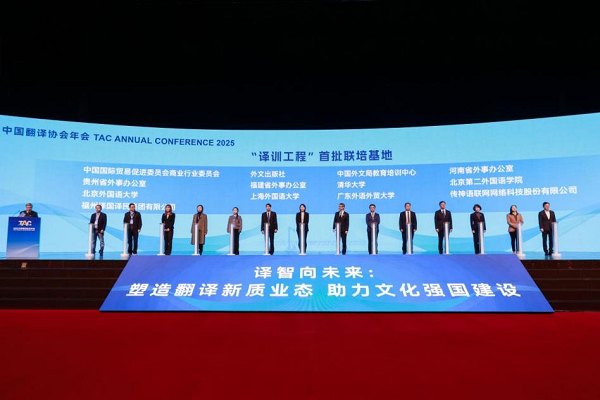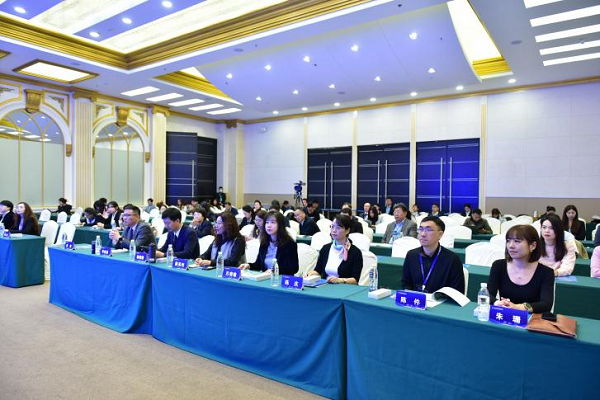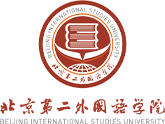
Representatives from Beijing International Studies University (BISU) recently attended the 2025 Translators Association of China (TAC) annual conference.
The conference, which opened on April 24 in Dalian, Liaoning province, was guided by China International Communications Group (CICG) and hosted by the Translators Association of China, CICG Academy of Translation and Interpretation and Dalian University of Foreign Languages (DUFL).
BISU attendees included Cheng Wei, a member of the Standing Committee of the CPC BISU Committee and vice-president of the university, vice-president of TAC and president of the Beijing Translators Association.
During the conference, the launch ceremony of the "Four Translation Projects" (i.e., projects for translation talent, translation dissemination, translation research and translation training) was held.
Meanwhile, Cheng represented BISU in the signing ceremony of the first group of joint training bases for the "Translation Training Project".

Cheng Wei (R3) joins the signing ceremony for the first group of joint training bases for the "Translation Training Project".
The first group of joint training bases for the "Translation Training Project" includes 13 institutions, covering government agencies, universities, industry organizations and enterprises. Its purpose is to build a collaborative training mechanism for industry, academia, research and practical application, to establish a new mechanism for cultivating, reserving and integrating high-end translation talents and to provide intellectual support for the construction of the country's translation and international communication capabilities.
Cheng was also invited to attend a seminar held at DUFL themed "AI Empowering Translation Talent Career Development and Employment Guidance".
She spoke about the importance of "three combinations" in translation education in the AI era: combining traditional translation skills with the application of new technologies, integrating professional education with interdisciplinary learning and combining theoretical teaching with practical application to enhance students' practical abilities through school-enterprise cooperation.
A seminar on "Translation and the Construction of China's Foreign Discourse System in the New Era", co-hosted by BISU and the Beijing Translators Association, was also held on the same day, during which Cheng delivered a speech.
Jiang Yu, deputy dean of BISU's School of Interpreting and Translation and secretary-general of the Beijing Translators Association, presided over the event.
Academic and industry experts held discussions on topics such as translating Party and government documents, technology-enabled language services and talent cultivation through interdisciplinary dialogue, providing diverse perspectives on empowering the construction of a foreign discourse system through translation.
On April 25, Cheng attended the "Health Wisdom in Words" Medical Language Service and Health Communication Seminar and delivered a speech there.
Discussions at the seminar focused on the future development of language services and health communication, and valuable practical experiences and innovative ideas were shared.

The "Health Wisdom in Words" Medical Language Service and Health Communication Seminar is held on April 25 at DUFL.
The event drew experts and scholars from the fields of translation studies, communication and artificial intelligence. Nearly 6,000 viewers tuned in to the live streaming of the event.
During the annual conference of the TAC, the "Guidelines for the use of English in cultural heritage areas" and the "Specifications for the use of English in public signs in healthcare" were officially released. "Guidelines for the use of English in cultural heritage areas" were drafted at BISU and Peng Tianyang, the dean of the School of Interpreting and Translation, participated as an expert in the drafting process.
It is the first set of systematic English translation standards regarding China's cultural heritage, and provides a reference for improving the accuracy and standardization of international communication on Chinese cultural heritage, which is greatly significant for enhancing the dissemination power and influence of Chinese civilization and telling China's stories well.
BISU also led the drafting of the "Specifications for the use of English in public signs in healthcare" with Peng, Jiang Lu, dean of the School of European Studies, and Zhu Shan, associate professor of the School of Interpreting and Translation, in charge of the project.
This set of standards, based on the international exchange needs of medical and health services, aims to provide clear and operational translation guidelines for medical and health institutions, related enterprises and institutions, and practitioners to eliminate language barriers in medical services, help integrate Chinese medical and health services into the global system, and enhance international discourse power and influence.
At the Industry Report Interpretation and Analysis Seminar, Peng delivered a speech titled "Development of the Translation Industry in the Era of Artificial Intelligence: Adherence and Innovation". Drawing from the Report on the Development of China's Translation Industry, he pointed out that while artificial intelligence accelerates industry transformation, the demand for high-quality translation and the value of talents remain unchanged. It is necessary to promote human-machine collaboration through "adherence and innovation" to strengthen the industry's ability to serve national strategies and social development.
Among the participants in another seminar themed "Translation Capability and Innovative Research in Translation Teaching" were experts, scholars and postgraduates from Beijing Foreign Studies University, BISU, Nanjing University, Lanzhou University and DUFL. The discussions focused on cutting-edge research topics related to cultivating translators, translation research and translation education. Jiang chaired the seminar and, utilizing both theory and practice, delivered a speech titled "Changes and Constants in Interpreting Teaching in the Era of AIGC".

Links
